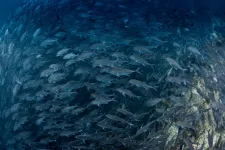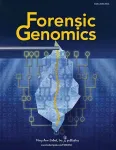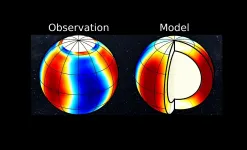(Press-News.org) Millions of people in countries around the world could face an increased risk of malnutrition as climate change threatens their local fisheries.
New projections examining more than 800 fish species in more than 157 countries have revealed how two major, and growing, pressures - climate change and over-fishing - could impact the availability of vital micronutrients from our oceans.
As well as omega-3 fatty acids, fish are an important source of iron, zinc, calcium, and vitamin A. A lack of these vital micronutrients is linked to conditions such as maternal mortality, stunted growth, and pre-eclampsia.
Analyses by an international team from the UK and Canada and led by scientists from Lancaster University reveal that climate change is the most pervasive threat to the supply of essential micronutrients from marine fish catches, and threatens the supply of vital micronutrients from fisheries in 40 per cent of countries. Fisheries micronutrient supplies were found to be less vulnerable to overfishing.
Countries among those whose fisheries micronutrient sources are at risk from climate change tend to be tropical nations and include East Asian and Pacific countries such as Malaysia, Cambodia, Indonesia, and Timor Leste, as well as Sub-Saharan African countries such as Mozambique and Sierra Leone.
This vulnerability to climate change for these nations' fisheries is particularly acute given dietary deficiencies in calcium, iron, zinc, and vitamin A are particularly prevalent in the tropics. And these tropical countries are also less resilient to disruptions of their fisheries by climate change because they strongly rely on fisheries to support their national economies and their population's diets and have limited societal capacity to adapt.
The study, which is outlined in the paper 'Micronutrient supply from global marine fisheries under climate change and overfishing', is published today by Current Biology.
Previous studies, most notably research into the micronutrient content of fish, which was led by Professor Christina Hicks and published by Nature, showed that fish are unequal when it comes to their nutritional content. A range of factors, such as diet, sea water temperature and energetic expenditure influence the amount of micronutrients that fish contain. Tropical fish tend to be richer in micronutrients than cold water species.
When it comes to resilience to climate change and fishing, again not all fish are equal. Earlier studies by Professor William Cheung and colleagues have shown large fish species that have a small range tend to be more vulnerable to climate change. While species that take longer to reach maturity and grow slower, are more vulnerable to fishing - because it takes longer for their stocks to replenish.
Their findings show only a weak link between the micronutrient density of an individual fish species' and its vulnerability to climate change or overfishing.
However, when the scientists looked at countries' overall fisheries catches then their findings revealed a clear impact from climate change on the overall availability of micronutrients for around 40 per cent of nations - threatening the food security of millions of people living in these countries.
A key reason for why climate change is such a threat comes down to the species of fish that the countries are targeting as part of their catches.
Some tropical nations' fishers are targeting micronutrient-dense species that have an increased vulnerability to climate change, such as Indian and short mackerels (Rastrelliger kanagurta and Rastrelliger brachysoma), bonga and hilsa shads (Ethmalosa fimbriata and Tenualosa ilisha) and dolphinfish (Coryphaena hippurus).
However, there is a silver-lining to the study's findings which offers some hope for the future. Some countries may be able to adapt their fisheries to switch from vulnerable species and instead target alternative micronutrient-rich species that are also resilient to both climate change and overfishing, but which are currently under-represented within catches.
Dr Eva Maire, of Lancaster University and Lead author of the study, said: "As climate change and over-fishing are significant and growing pressures on global fish stocks, it is essential for the dietary requirements of millions of people to know the extent that these pressures will have on the availability of micronutrients in our seas in the future.
"We have shown that climate change is the most pervasive threat to the supply of vital micronutrients for many countries around the world, and in particular in the tropics.
This study draws on the 'FishNutrients' model, a recently released finfish nutrient composition database.
"These data open up a whole new area of research and are crucial to address global food security challenges" said co-author Aaron MacNeil, Associate Professor in the Ocean Frontier Institute at Dalhousie University. "Our research highlights that efforts to improve food security and to tackle malnutrition there is a need to integrate fisheries, climate and food policies to secure these micronutrients for existing and future generations."
Professor William Cheung, co-author from the University of British Columbia, said: "As well as highlighting the growing threat of climate change to the food security of millions of people, our study also offers hope for the future. Armed with nutritional information about different fish species, many countries have the capacity to adapt their fisheries policies to target different more resilient fish species. By doing this then these nations can ensure a more reliable supply of micronutrients for their people."
INFORMATION:
This research was funded by the European Research Council, the Royal Society, the Leverhulme Trust and NSERC Canada.
The paper's authors are Eva Maire, Nick Graham, James Robinson and Christina Hicks of Lancaster University; Aaron MacNeil of Dalhousie University; and William Cheung and Vicky Lam of the University of British Columbia.
DOI: 10.1016/j.cub.2021.06.067
PHILADELPHIA -- (July 20, 2021) -- Alternative polyadenylation (APA) is an RNA processing mechanism that regulates gene expression by generating different ends on RNA transcripts of the same gene. Though it affects more than half of human genes, the significance of APA was poorly understood. Now a new study by The Wistar Institute describes an important function of APA in allowing certain mRNAs to reach specific sites of protein synthesis and reveals that length, sequence and structural properties can determine the destination (and fate) of mRNAs within the cell. These findings, published online in the journal Cell Reports, shed light on the consequences of APA that may represent a paradigm shift in the mRNA metabolism field.
The ...
What The Study Did: Credit reports were analyzed to estimate the amount of medical debt in collections nationally and by geographic region and income group and its association with Medicaid expansion under the Affordable Care Act.
Authors: Neale Mahoney, Ph.D., of Stanford University in Stanford, California, is the corresponding author.
To access the embargoed study: Visit our For The Media website at this link https://media.jamanetwork.com/
(doi:10.1001/jama.2021.8694)
Editor's Note: The article includes funding/support disclosures. Please see the article for additional ...
New Rochelle, NY, July 19, 2021--Duct tape and items retrieved from the water are common pieces of evidence in forensic cases. A new study evaluates the recovery of DNA from folded duct tape that has been submerged in ocean water for up to 2 weeks. The study is published in the peer-reviewed journal Forensic Genomics. Click here to read the article now.
Joseph Donfack, PhD, from the Federal Bureau of Investigation (FBI) Laboratory Division, and coauthors showed that it is possible to recover enough DNA to yield a complete short tandem repeat (STR) profile from folded duct tape that has been submerged in ocean water for up to 2 weeks if the initial ...
On 23 July 2012, humanity escaped technological and economic disaster. A diffuse cloud of magnetized plasma in the shape of a slinky toy tens of thousands of kilometers across was hurled from the Sun at a speed of hundreds of kilometers per second.
This coronal mass ejection (CME) just missed the Earth because its origin on the Sun was facing away from our planet at the time. Had it hit the Earth, satellites might have been disabled, power grids around the globe knocked out, GPS systems, self-driving cars, and electronics jammed, and railway tracks ...
Retail traders often fear that reducing the amount of urban space made available for parking private vehicles would have a negative effect on their businesses. A survey conducted by researchers from the Institute for Advanced Sustainability Studies (IASS) on two shopping streets in Berlin shows that traders have a skewed perception of their customers' mobility habits. The findings of this research will facilitate better-informed decision-making around urban land-use planning.
The researchers surveyed around 2,000 customers and 145 retailers on Kottbusser Damm (Friedrichshain-Kreuzberg district) and Hermannstraße (Neukölln district). The vast majority of shoppers - 93 per cent - had not travelled to their ...
No benefit of high-flow therapy (HFT) can be derived from the available study data for patients with advanced chronic obstructive pulmonary disease (COPD) or chronic type 1 respiratory failure. It therefore remains unclear whether this form of treatment has advantages over long-term oxygen therapy (LTOT) or non-invasive ventilation (NIV).
This is the conclusion of the benefit assessment that the Institute for Quality and Efficiency in Health Care (IQWiG) has now completed. The Federal Joint Committee (G-BA) had commissioned IQWiG to investigate the advantages and disadvantages of HFT in patients with stable, advanced COPD or chronic respiratory failure with oxygen deficiency ...
These motions were measured by analyzing 10 years of observations from NASA's Solar Dynamics Observatory (SDO). Using computer models, the scientists have shown that the newly discovered oscillations are resonant modes and owe their existence to the Sun's differential rotation. The oscillations will help establish novel ways to probe the Sun's interior and obtain information about our star's inner structure and dynamics. The scientists describe their findings in today's issue of the journal Astronomy & Astrophysics.
In the 1960s the Sun'ss high musical notes were discovered: The Sun rings like a bell. ...
New findings from zoologists working with birds in Southeast Asia are shining fresh light on the connections between animal behaviour, geology, and evolution - underlining that species can diversify surprisingly quickly under certain conditions.
The zoologists, from Trinity College Dublin's School of Natural Sciences, sequenced DNA and took measurements and song recordings from Sulawesi Babblers (Pellorneum celebense), shy birds that live in the undergrowth on Indonesian islands.
Although these islands were connected by land bridges just tens of thousands of years ago, and although the babblers look ...
One of the leading thinkers in nano-science has called on the energy materials community to help finally put an end to the world's reliance on fossil fuels.
In a hard-hitting editorial published by Energy and Environmental Materials, Professor Ravi Silva, Director of the Advanced Technology Institute (ATI) at the University of Surrey, argues that there are no coherent excuses left to justify the use of fossil fuels. In his paper, Professor Silva challenges the scientific community to lead the world away from a reality where fossil fuels still account for 80 per cent of the energy mix.
While the cost of clean energy generation has plummeted over recent years, ...
Hydropower has massive potential as a source of clean electricity, and the Indus basin can be a key player in fulfilling long-term energy storage demands across Africa, Asia, Europe, and the Middle East. IIASA researchers explored the role the Indus basin could play to support global sustainable development.
According to the International Energy Agency (IEA), the growth of hydropower plants worldwide is set to slow down this decade. This puts at risk the ambitions of countries across the globe aiming to reach net-zero emissions while ensuring reliable and affordable energy supplies for their citizens. Even so, there are thousands of dams planned to be built this next decade. New hydropower dams installed worldwide are forecasted to increase global hydroelectricity ...





